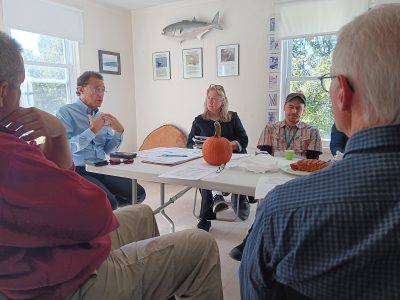County Pressed for Maintenance Plan at Croton Point Grasslands
News Based on facts, either observed and verified directly by the reporter, or reported and verified from knowledgeable sources.

Westchester County parks and conservation officials appeared agreeable last week to finding a way to restart a regular maintenance schedule for an environmentally unique grassland at Croton Point Park.
A long-awaited meeting last Friday at the park’s nature center involving area environmentalists and representatives from the county Department of Parks, Recreation and Conservation and other agencies ended with acknowledgement that maintaining the roughly 86-acre capped landfill site was essential for the park and for wildlife.
In August, The Examiner reported on the concerns raised by the conservationists that potentially threatened the habitat.
Reimbursable grant money from the state Department of Environmental Conservation (DEC) stopped in February 2022, making maintenance sporadic. As a result, the area is being overrun by multiple species of invasive vines, according to several in attendance representing various conservation groups.
Peter Tartaglia, first deputy commissioner for the Department of Parks, Recreation and Conservation, said the county needs to assess the condition, come up with a plan out how to perform the upkeep on a relatively limited budget. There is now a $40,000 annual contribution from the county Soil and Water Conservation District for maintenance of the site.
“What is coming out from this is the most important thing right now is the health of the grasslands and where we need to go from here, what we need to do immediately, with the little bit of money that we have, and then we have to develop a plan,” Tartaglia said.
From 2016 until February 2022, the Soil and Water Conservation District managed the maintenance plan at the site, said county Environmental Planner Nicole Laible. About $500,000 was granted to the soil district through the state DEC to maintain the site and another $100,000 was provided by the state Department of Agriculture and Markets.
After the landfill was closed in 1986, an initial attempt to turn the site into a meadow was unsuccessful, Laible said. Then the Westchester Parks Foundation approached the county in 2015 about making it a grassland, which was accomplished, until the maintenance lapsed about 20 months ago.
Anne Swaim, executive director of the Saw Mill River Audubon, said the county must learn the true condition of the grasslands to see what work needs to be done.
“An independent evaluation of where we really are up there would help everybody in what has been established, and then what’s beyond, in two years without maintenance because of what was left after the project was closed,” Swaim said.
“It’s a wonderful project; we can’t say that enough how amazing this was that this was done and how significant this grasslands issue is,” she said.
The site is the only grasslands of its kind for about 50 to 60 miles, and along with its location on the Hudson River, it becomes a place for a wide assortment of bird species that migrate between Canada and Central America, Swaim said. The park, one of more than 50 county parks facilities, is also the site of the annual EagleFest in early February because of the prevalence of bald eagles at that time of year.
Once an assessment is completed, the county would have to follow through on whatever maintenance plan is recommended. Charlie Roberto, who represents various organizations and is a Teatown Lake Reservation volunteer, said it may not be necessary to mow the site four times a month from May through September.
“We kept the area pretty much intact, so it looked like a big horseshoe and it gave a refuge for the birds that came migrating,” Roberto said.
Jason Klein, director of conservation for Westchester County, said there have been some changes to the mowing schedule over time.
“We hit the areas where the invasives were coming back,” Klein said. “
There has also been some spot spraying of herbicides by the county’s consultant, Weiner Associates.
The challenge facing the county is that when invasive vines attack an area, they grow quickly, said Joseph Wallace, a Croton-on-Hudson resident and avid birder who frequently visit the park with his wife. Only an ongoing maintenance plan will stave off the advancing invasives, he said.
“It’s like a slow-motion horror movie when they come in, but it’s not even that slow-motion,” Wallace said. “It’s hard to overstate how quickly these things get in there.”
Tartaglia said the concerns raised are understood and the best way to address the address the challenges will have to be identified. He hopes to also have periodic meetings to monitor the grasslands.
“We care about what we do,” he said. “We’re not perfect, everything isn’t always perfect. We can’t always do everything we’re asked to do. We don’t want to lose this land. That is the last thing we want to do is lose this land.”
Swaim and Wallace said they were encouraged by the county’s response and they await what’s next.
“I look forward to seeing what happens next because that is, of course, the issue here,” Wallace said. “It feels like this precious place is being treated with the importance it deserves.”

Martin has more than 30 years experience covering local news in Westchester and Putnam counties, including a frequent focus on zoning and planning issues. He has been editor-in-chief of The Examiner since its inception in 2007. Read more from Martin’s editor-author bio here. Read Martin’s archived work here: https://www.theexaminernews.com/author/martin-wilbur2007/
